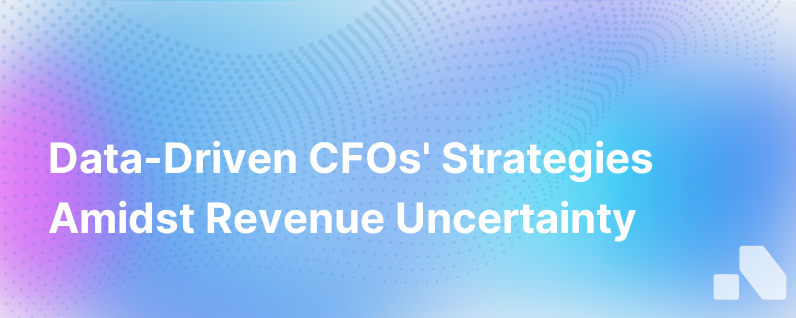How Data Driven Cfos Navigate Through Revenue Uncertainty
Published on January 2, 2024 by Sawyer Middeleer
In the tumultuous financial landscape where businesses operate today, revenue uncertainty has become a daunting challenge, one that can keep even the most seasoned CFO awake at night. The days when financial officers could rely solely on historical data and seat-of-the-pants forecasting are long gone. In their stead, a new breed of CFOs has emerged, those who wield data as their compass to navigate the treacherous waters of revenue volatility. The data-driven CFO is not merely a number cruncher; they are strategic pioneers, utilizing insights gleaned from data to steer their organizations towards financial stability and growth.
The Environment of Revenue Uncertainty
Revenue uncertainty stems from myriad sources: economic fluctuations, market volatility, regulatory changes, competitive pressures, technological innovations, and unpredictable consumer behaviors, to name a few. These factors create a rapid and sometimes abrupt need to adjust revenue expectations and financial strategies. The data-driven CFO's role is to provide a steady hand at the tiller by translating data into actionable intelligence.
The Data-Driven CFO's Toolkit
To counter revenue uncertainty effectively, CFOs arm themselves with a sophisticated toolkit. It includes advanced analytics software, forecasting models, data visualization tools, and AI-driven platforms capable of processing vast amounts of structured and unstructured data.
Predictive Analytics and Forecasting
Predictive analytics is at the core of the data-driven approach. By analyzing historical data and identifying trends, these analytical tools can predict future revenue streams with a higher degree of accuracy. Forecasting models have evolved to incorporate a variety of data sources, including market trends, social media sentiment, and economic indicators, to create multi-dimensional predictive insights.
Real-Time Data and Performance Dashboards
Real-time data enables CFOs to monitor the health of the business continuously. Performance dashboards aggregate financial metrics, operational data, and KPIs, providing an at-a-glance overview of the company's financial status. These tools help CFOs make informed decisions quickly in response to emerging threats or opportunities.
Scenario Planning and Stress Testing
CFOs employ scenario planning to prepare for various potential futures by understanding the financial implications of different market conditions and business choices. Stress testing financial models against extreme scenarios ensures that companies can withstand unexpected shocks and maintain liquidity.
Communication and Collaborative Tools
The modern CFO acts as a cross-organizational leader who must share insights and forge consensus among stakeholders. Collaboration tools facilitate information sharing and collective decision-making, while effective communication ensures that other leaders understand financial strategies and outcomes.
Strategies for Navigating Revenue Uncertainty
With these tools at their disposal, data-driven CFOs employ several strategies to navigate through revenue uncertainty:
Continuous Planning and Rolling Forecasts
Rather than relying on annual budgets as a fixed guide, data-driven CFOs adopt continuous planning cycles. They use rolling forecasts to adjust predictions based on the latest data, allowing for more agility in financial planning. This approach ensures that resource allocation remains aligned with market realities.
Identifying New Revenue Streams
Data provides insights into customer preferences and unmet needs that can reveal opportunities for new products or services. By identifying these new revenue streams, CFOs can mitigate the impact of downturns in other areas of the business.
Cost Optimization and Efficiency
In times of uncertainty, preserving cash becomes a top priority. Data-driven CFOs use data analytics to identify areas where costs can be cut without compromising strategic initiatives. This might involve optimizing supply chains, reducing operational inefficiencies, or renegotiating vendor contracts.
Capital Allocation and Risk Management
Investing in growth while managing risk is a delicate balancing act. Data-driven CFOs use advanced models to evaluate the risk-reward profile of investment opportunities, ensuring that capital allocation decisions are grounded in empirical evidence.
Driving Cross-functional Collaboration
Finance no longer operates in a silo. Data-driven CFOs work closely with other departments to ensure that data insights translate into coordinated actions across the company. They foster a culture where data is shared and utilized for collective decision-making.
Regulatory Compliance and Reporting
Financial regulations continue to evolve, imposing additional reporting burdens on organizations. Data-driven CFOs leverage technology to automate compliance processes, ensuring accuracy and freeing up time to focus on strategic tasks.
Talent Management and Organizational Structure
The finance function is changing, and the need for analytical talent has never been higher. Data-driven CFOs understand the importance of having the right team structure and skillsets to derive and act on data insights.
Embracing Advanced Technologies
Data-driven CFOs embrace the latest advancements in AI, machine learning, and automation to enhance their effectiveness. These technologies can unearth deeper insights, automate routine tasks, and foresee trends that humans can't detect, thereby refining financial forecasts and strategies.
Conclusion
The era of revenue certainty may be a thing of the past, but data-driven CFOs have the capabilities to thrive even in the most uncertain conditions. By adopting a data-first mindset and leveraging technology, they transform financial planning into a dynamic, responsive, and proactive function. This evolution ensures that businesses can stay on course regardless of the financial storms they may encounter. Data-driven CFOs are the new navigators for today's revenue uncharted waters.